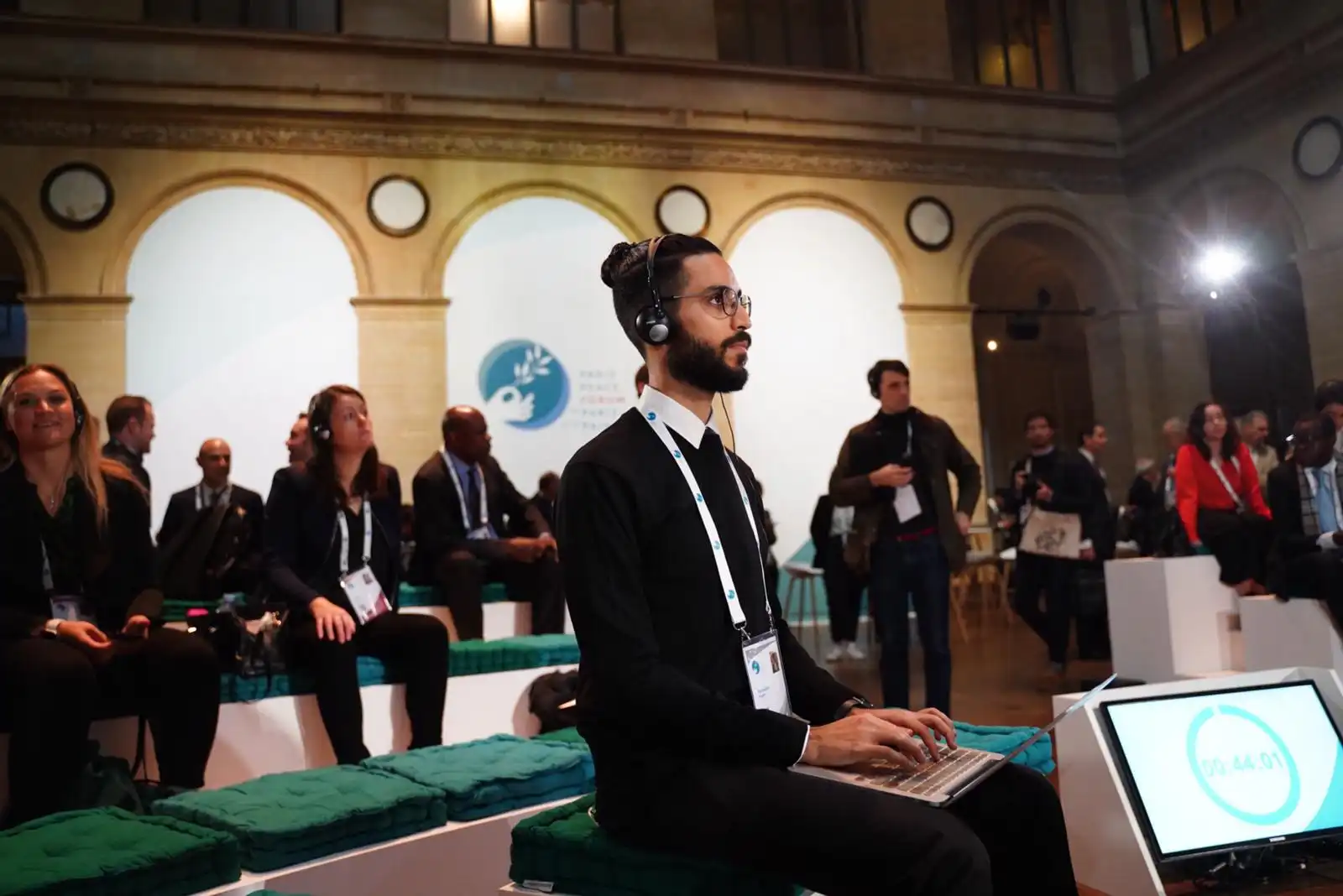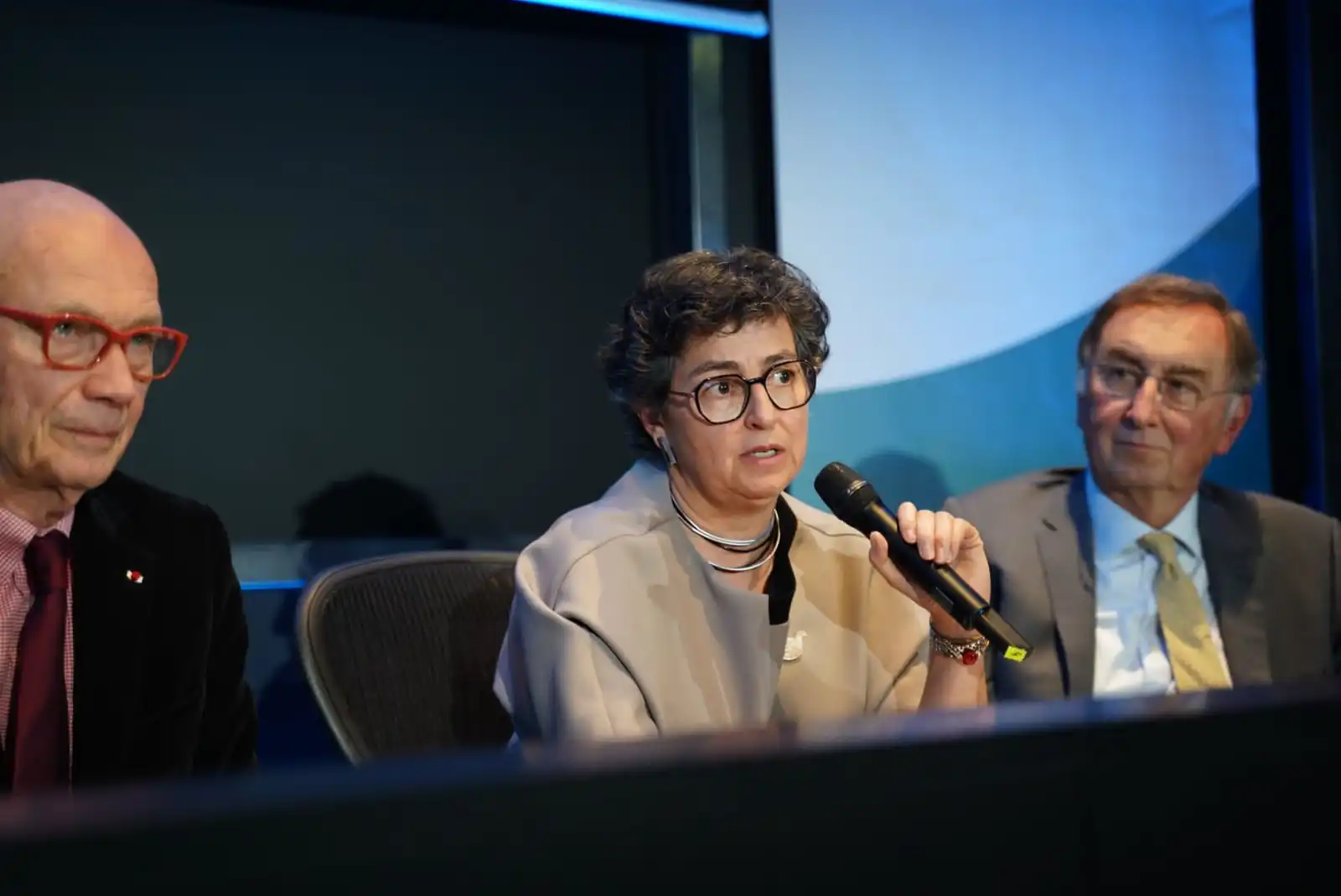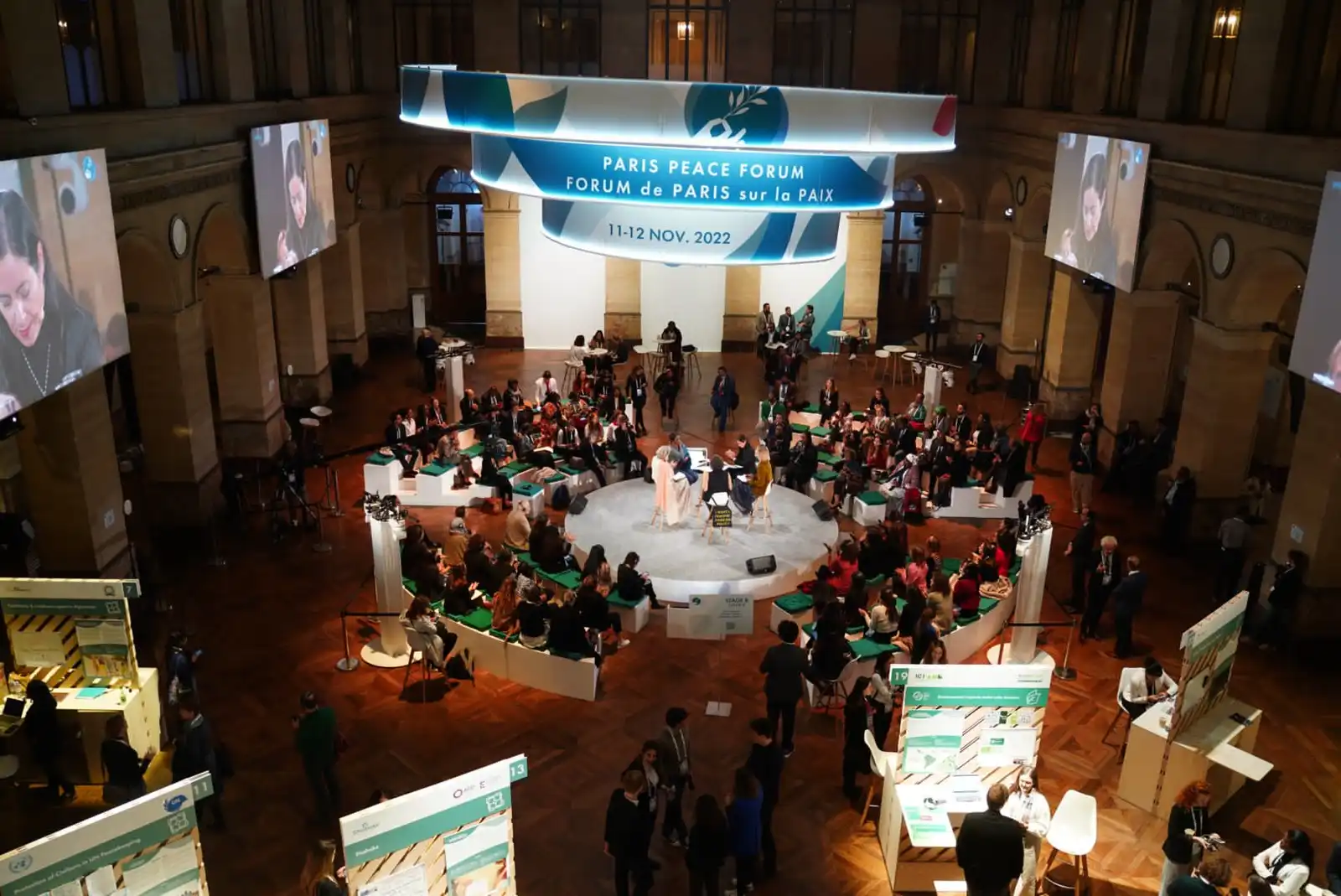Home>Behind The Scenes: Paris Peace Forum 2022, A Student’s Journey
18.11.2022
Behind The Scenes: Paris Peace Forum 2022, A Student’s Journey
Faridoddin Pesteh, a student of Sciences Po’s Paris School of International Affairs (PSIA) was a volunteer at the Paris Peace Forum 2022 (PPF 2022). He shared his two-day experience as an international affairs students but also a future leader.
Curiosity, courage and commitment
This past weekend, I had the opportunity and pleasure to attend the 5th edition of the annual Paris Peace Forum (PPF) on 11 and 12 November, which took place at the Palais Brongniart. Since 2018, the PPF has brought together leaders from around the world to foster cooperation and collective action in addressing global problems. The theme for this year’s event, Riding out the Multi-Crisis, emphasized the importance of multilateral solutions to complex and critical challenges facing humanity today. The event hosted close to 5,000 participants, presented 80 panels or roundtables, and showcased 70 projects.
While attending the various sessions and panels as a PSIA student, I was constantly reminded of three words that were highlighted by Dean Arancha Gonzalez earlier in September: “curiosity, courage, and commitment.” Those words resonated with me during my first week at PSIA and they resonated with me again at the Forum.
This event was a wonderful reminder that in facing today’s challenges, we need actors and leaders who value these traits. We need leaders who are open-minded and curious to hear innovative solutions and we need them to act with commitment and courage.
This event was also a great reminder that we, as PSIA students, can foster these traits by engaging in the various events offered by our school.
A connection between the theoretical and the practical
As an immigrant native to a small town at the heart of Iran, I felt an immense privilege but also a sense of responsibility – responsibility to learn and absorb as much as I can – while attending sessions or conversing with project leaders. The event was also a great opportunity for me and my peers to make connections. That is, connections with leaders in the public and private sectors, but also connections between what we learn in class and how it is applied in the field. The importance of making this connection between ‘the theoretical’ and ‘the applied’ was a recurring theme in my conversations with various PSIA students attending the event.
I had the pleasure of conversing with my program’s Master Representative, Yana Ghazi, on the last day of the Forum and hearing her thoughts about the event. She highlighted how important it is for students, especially those who may have limited professional experience, to attend events such as the PPF and see how things function “in the real world.” She enjoyed the moderated discussions on timely topics, such as the importance of preserving cultural heritage when it comes to post-conflict resolution and remediation. She also told me that the themes of this event directly relate to courses she is taking as part of the Peace & Development block of the PSIA curriculum. As the representative for the International Security program, she believes that this kind of events can perfectly complement our education and prepare us for our future endeavours, as we strengthen intangible skills (such as intercultural communication or networking skills) that may be difficult to teach in a classroom setting.
Topics of all sizes deserve to be discussed
I also had the opportunity to chat with Jeanne Chassereau, who was a volunteer coordinator at the event. Jeanne shared that she was very impressed by the diversity of events and topics covered in the Forum, combining a mix of specialized and broader question topics. For instance, the event showcased projects that focus on important regional issues, such as the use of AI to address issues of development in the public sector in Latin America, to global-scale topics such as the need for reform in the global health architecture to improve pandemic preparedness. Jeanne and I also discussed how such a big profile event, which involves many high-profile members, gives space to niche topics and grass root organizations, NGOs, and research centres to showcase their work.
The Forum also reminded us as students that “to foster peace and development, there is need to support local initiatives but also learn from local organisations”, as Jeanne highlighted it. With its unique approach, the PPF allows knowledge to flow from “the local to the global”, fostering conversation between grassroot organisations and large, multinational entities.
The importance of dialogue
During my time at the Forum, I also got to connect with friends from other PSIA programs. In my conversations with Kiti Fodor, who is an International Development student, I was reminded of the importance of dialogue between different academic and professional fields. Specifically, Kiti told me that what stood out to her while attending various sessions was the importance of communication between development and security actors. We both laughed as we realised that even our conversation was between two International Development and International Security students. It is true that both fields pursue different but highly interdependent goals and Kiti’s remarks reminded again of a key word emphasized by Arancha Gonzalez: curiosity. The PPF was a wonderful opportunity for PSIA students to hear from experts in fields different from ours and practice curiosity.
I believe that having curiosity is as important as having knowledge and I’m grateful to PSIA and the PPF for the opportunity to enhance both this past weekend.
Sharing an incredible journey: Indigenous communities in Cambodia
I had a very moving and inspiring conversation with a bright woman from Cambodia, Munny Rochom, who identifies as Indigenous and is pursuing her studies in the field of cybersecurity. We were neighbors while listening to a panel titled Launching a Feminist Pledge for International Investment, and began chatting at the end of the session about the importance of education. She shared with me her incredible journey to the PPF as a student volunteer with the Open Development Cambodia (ODC) project, a project that underscores the importance of access to information and data to support the efforts of Indigenous and Ethnic Minority (IEM) communities in exercising their rights to self-determination and self-governance. The ODC project (titled Open Data for Indigenous and Ethnic Minority) was showcased in the Space for Solutions organised by PPF, a dedicated space where organisations, researchers, and project leaders could directly engage with the Forum’s participants.
Munny emphasized the importance of education and her desire to develop and protect her community. She taught me that Cambodia is home to 24 Indigenous groups and noted that global issues discussed at the event, such as global warming, are having a direct impact on her community. Showcasing a beautiful Indigenous outfit, Munny also felt it was important to highlight the issues facing Indigenous communities in a high-profile event. Part of our discussion also focused on digital literacy and data literacy. Munny noted that Cambodia, like many developing countries, has become more and more digitally connected. However, she noted that more work needs to be done in protecting the IT infrastructures and data centres of the country, which is why she hopes to become a leader in the cybersecurity field.
Thank you to Faridoddin Pesteh, Pieter Zijlstra and Clément Gibon.
MORE INFORMATION:


